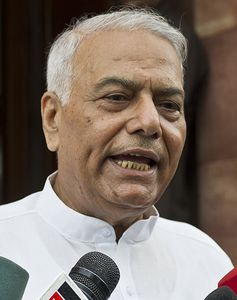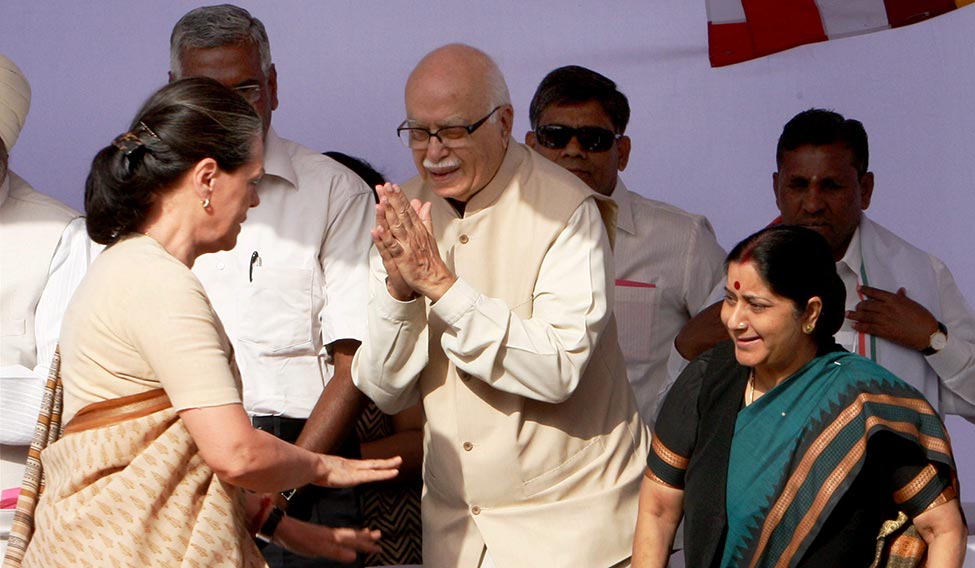 Yashwant Sinha
Yashwant Sinha
Sonia Gandhi has led a difficult and challenging life in India. Marrying a foreigner and settling down in the strange country of her husband would be traumatic for any young woman. Marrying the son of the prime minister of India and coming to live here in the prime minister’s house must have been a very unusual experience.
Her aversion to politics has always been well known. She perhaps enjoyed a degree of comfort when her husband, Rajiv Gandhi, stayed away from politics and led the life of an ordinary pilot of the Indian Airlines. But the sudden and tragic death of her brother-in-law, Sanjay Gandhi, forced her husband to give up his career as a pilot and enter politics. Since he was no ordinary person, he was soon included in the highest echelons of the party and another sudden and tragic death in the family, this time that of her mother-in-law, pitchforked her husband into the prime minister’s chair.
The die was cast and despite all her reluctance Sonia Gandhi was forced to play her role as the prime minister’s wife. She was not cut out for the responsibility that was suddenly thrust upon her. She could barely speak Hindi. She did not understand India in its myriad ways. She followed a religion that was different from the religion of the majority of the people. She looked different. She had nothing that could endear her to the people of India. Soon jokes about her ignorance of India started making the rounds—like when on a visit to a village with her husband she innocently asked an official why the huts in which the poor villagers lived did not have their name plates outside their houses. I am sure such stories were invented and untrue but they were still circulated widely.
It was an impossible situation. A lesser person would have given up, especially after the death of her husband, and perhaps gone back to Italy. But not her. She battled on and soon emerged as a leading light on the political firmament of India. Despite all her handicaps, she had arrived.
I did not get to know her personally when I was finance minister in the Chandra Shekhar government, though I got to know her husband who was supporting the government from the outside well enough. But when I joined the Vajpayee government in 1998 and she became the leader of opposition in the Lok Sabha, not only did we meet in Parliament and in other official meetings, but I also met her socially in state dinners in the Rashtrapati Bhavan, where we often sat next to each other. In Parliament and other official meetings she was generally aloof and distant; she would say her piece and then generally stay quiet, her colleagues doing the rest of the talking. But during the dinners in the Rashtrapati Bhavan she was a delightful conversationalist and could talk on a number of issues with ease. We did not discuss politics on these occasions, but shared our other experiences. On occasion we did talk about how ridiculous politics could get at times.
As the leader of opposition in the Lok Sabha, she would read out her speeches, often in English. This was against the rules, but she was rarely disturbed. Such was her presence and aura. In the cut and thrust of parliamentary debates she was no match for Vajpayee, an old warhorse. She did lose out in some debates, but soldiered on undeterred. As a political adversary we felt the heat of her masterstroke when she was able to persuade Jayalalithaa to withdraw support to our government and in the vote of confidence that followed we lost by just one vote. She succeeded in dislodging our government, but failed to form her own, and the country had to go for general elections within 18 months of the previous one. We returned with a superior majority and she had to be content with being the leader of opposition once again. She finally achieved her goal in 2004 when she helped the Congress emerge as the single largest party and form a coalition government.
Thus, the roles were reversed in 2004. We were in the opposition and she was in the government. Though she was not the prime minster, there was no doubt that she was the tallest leader of the UPA. She attended Parliament regularly and sat through important debates. I was a trenchant critic of the government and was often harsh in the choice of my words. On more than one occasion I noticed that she would incite her members to interrupt my speech, often leading to suspension of proceedings. But she never encouraged her members to get personal. Sometimes, she would also upbraid them in private for crossing the line, as friends in her party informed me.
Her knowledge of matters economic was hardly profound. When in the opposition she had to criticise the government’s economic policies when she intervened in debates. Her facts were often twisted to suit her arguments. I would sit and smile making it amply clear that I did not agree with her. On one occasion in the 15th Lok Sabha I made a spirited speech on our relationship with Sri Lanka and severely criticised the policies of the UPA government. She sat through the whole debate but not once did she allow her members to interrupt my speech. Perhaps, I was making sense and she wanted to hear a contrarian point of view.
Sonia Gandhi has scripted a role in the history of India which is unforgettable. She was a worthy adversary whether in government or in opposition. She bore herself with dignity in all the roles she has been called upon to perform in the difficult life she has led in the political field in India.
I wish her many more years in the service of India.
A former Union minister, Sinha is a BJP leader.






